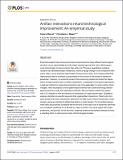| dc.contributor.author | Basnet, Subarna | |
| dc.contributor.author | Magee, Christopher L. | |
| dc.contributor.author | Magee, Christopher L | |
| dc.date.accessioned | 2018-01-22T15:59:53Z | |
| dc.date.available | 2018-01-22T15:59:53Z | |
| dc.date.issued | 2017-08 | |
| dc.date.submitted | 2016-11 | |
| dc.identifier.issn | 1932-6203 | |
| dc.identifier.uri | http://hdl.handle.net/1721.1/113251 | |
| dc.description.abstract | Empirical research has shown performance improvement of many different technological domains occurs exponentially but with widely varying improvement rates. What causes some technologies to improve faster than others do? Previous quantitative modeling research has identified artifact interactions, where a design change in one component influences others, as an important determinant of improvement rates. The models predict that improvement rate for a domain is proportional to the inverse of the domain’s interaction parameter. However, no empirical research has previously studied and tested the dependence of improvement rates on artifact interactions. A challenge to testing the dependence is that any method for measuring interactions has to be applicable to a wide variety of technologies. Here we propose a novel patent-based method that is both technology domain-agnostic and less costly than alternative methods. We use textual content from patent sets in 27 domains to find the influence of interactions on improvement rates. Qualitative analysis identified six specific keywords that signal artifact interactions. Patent sets from each domain were then examined to determine the total count of these 6 keywords in each domain, giving an estimate of artifact interactions in each domain. It is found that improvement rates are positively correlated with the inverse of the total count of keywords with Pearson correlation coefficient of +0.56 with a p-value of 0.002. The results agree with model predictions, and provide, for the first time, empirical evidence that artifact interactions have a retarding effect on improvement rates of technological domains. | en_US |
| dc.publisher | Public Library of Science (PLoS) | en_US |
| dc.relation.isversionof | http://dx.doi.org/10.1371/JOURNAL.PONE.0179596 | en_US |
| dc.rights | Creative Commons Attribution 4.0 International License | en_US |
| dc.rights.uri | http://creativecommons.org/licenses/by/4.0 | en_US |
| dc.source | PLoS | en_US |
| dc.title | Artifact interactions retard technological improvement: An empirical study | en_US |
| dc.type | Article | en_US |
| dc.identifier.citation | Basnet, Subarna, and Magee, Christopher L. “Artifact Interactions Retard Technological Improvement: An Empirical Study.” Edited by Zhong-Ke Gao. PLOS ONE 12, 8 (August 2017): e0179596 © 2017 Basnet and Magee | en_US |
| dc.contributor.department | Massachusetts Institute of Technology. Department of Mechanical Engineering | en_US |
| dc.contributor.department | Massachusetts Institute of Technology. Institute for Data, Systems, and Society | en_US |
| dc.contributor.department | SUTD-MIT International Design Centre (IDC) | en_US |
| dc.contributor.mitauthor | Basnet, Subarna | |
| dc.contributor.mitauthor | Magee, Christopher L | |
| dc.relation.journal | PLOS ONE | en_US |
| dc.eprint.version | Final published version | en_US |
| dc.type.uri | http://purl.org/eprint/type/JournalArticle | en_US |
| eprint.status | http://purl.org/eprint/status/PeerReviewed | en_US |
| dc.date.updated | 2018-01-19T16:02:03Z | |
| dspace.orderedauthors | Basnet, Subarna; Magee, Christopher L. | en_US |
| dspace.embargo.terms | N | en_US |
| dc.identifier.orcid | https://orcid.org/0000-0001-9622-6247 | |
| dc.identifier.orcid | https://orcid.org/0000-0001-5316-8358 | |
| mit.license | PUBLISHER_CC | en_US |
